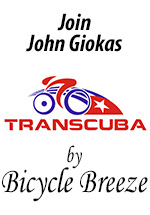February 11/06 6:45 am - Tyler Hamilton Appeal Rejected
Posted by Editoress on 02/11/06
Hamilton Appeal Rejected
The Court of Arbitration for Sport (CAS) has rejected Tyler Hamilton's appeal of his suspension from the 2004 Vuelta a Espana. Doping control tests from September 11 (2004) found that Hamilton had received a homologous blood transfusion. The American, who had won the gold medal at the Olympics a month earlier denied using banned substances or procedures and has been fighting the ruling ever since, challenging the reliability of the test. This latest ruling states that Hamilton's ban will run until September 22, 2006.
The UCI released the following statement today regarding the CAS decision:
The International Cycling Union has taken note of the conclusion of the procedure in front of the Court of Arbitration for Sport (CAS) following the appeal held by the rider Tyler Hamilton.
Whilst expressing its full satisfaction for the excellent cooperation with USADA (USA National Anti Doping Agency), the UCI welcomes the recognition of the validity of the method to detect homologous blood transfusion, which was introduced since the 2004 Olympics Games in Athens.
Hamilton continues to profess his innocence, stating on his website:
Based on my devastating personal experience over the last year and a half, I am committed to fighting for reform within the anti-doping movement. I do support the anti-doping mission and USADA, however the current system has failed an innocent athlete and needs to change.
Out of respect to fairness and the rights of all athletes, there should be clear separation between the agencies that develop new tests and those that adjudicate anti-doping cases.
Credible, independent experts, not those who funded or developed the original methodology, should be charged with properly validating new tests.
I don't believe any athlete should be subjected to a flawed test or charged with a doping violation through the use of a method that is not fully validated or generates fluctuating results.
I will also continue to support the formation of unions to help protect the rights of athletes. My goal is to keep other athletes from experiencing the enormous pain and horrendous toll of being wrongly accused.
The CAS has still to rule on a Russian appeal which have Hamilton stripped of his gold medal from Athens (Vjatcheslav Ekimov won silver, and would move up to gold). Hamilton's A sample showed similar problems as his Vuelta test, however, the B sample was damaged (frozen) and could not be tested.
An interesting piece of information that came out of the CAS findings was that Hamilton had had problematic readings dating back to April of 2004, when his Phonak team was tested by the UCI:
On 24 April 2004, the Appellant underwent a UCI health test during the Liege-Bastogne-Liege race and his reading was a little too high although it was thought to be due to "dehydration".
On 29 April 2004, the Appellant had a health test along with other members of the Phonak team and the readings were high although the Phonak team claimed the readings were higher than the team's own bllod measurements.
As a result of these test results, UCI held several meetings with the Appellant and representatives from the Phonak team. During the presentations at these meetings, Dr. Zorzoli of the UCI warned that a test on red blood cell antigens was in the process of being validated as an anti-doping test to detect an homologous blood transfusion. On 10 June 2004, the UCI sent a warning letter to the Appellant in which he was advised that "the blood checks that took place during the Tour of Romandie 2004...showed an abnormal profile " (as translated) and that the blood values showed "strong signs of possible manipulation". The letter warned the Appellant that he would be "closely monitored" in 2004.
| Return to Canadian Cyclist homepage | Back to Top |





